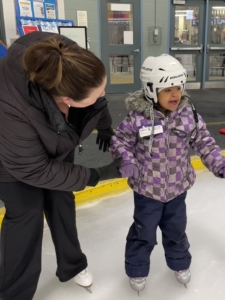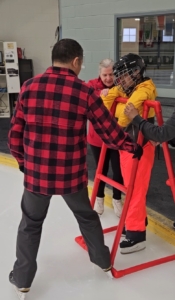Adaptive CanSkate is a Win for Everyone
In the Fall of 2022, the phone started ringing and emails started coming into the Kitchener-Waterloo Skating Club (KWSC). Parents had questions about possibilities for their children with disabilities to access the club’s CanSkate program. They wanted to know what kind of equipment was available and if there was a volunteer that could be with their child while they were on the ice.
 Debra Brown, Executive Director of KWSC, started looking at the landscape in her local community. There were programs like sledge hockey, gymnastics, baseball and even horseback riding but nothing regarding learning to skate. The demand was there but how could they make that work at their club? Inspired by the recent Skate Canada annual Ice Summit, Brown remembered a workshop focused on adaptive skating that a colleague of hers mentioned and had also returned with numerous resources. Slowly the pieces started coming together.
Debra Brown, Executive Director of KWSC, started looking at the landscape in her local community. There were programs like sledge hockey, gymnastics, baseball and even horseback riding but nothing regarding learning to skate. The demand was there but how could they make that work at their club? Inspired by the recent Skate Canada annual Ice Summit, Brown remembered a workshop focused on adaptive skating that a colleague of hers mentioned and had also returned with numerous resources. Slowly the pieces started coming together.
“We will need a process for kids to be accompanied on the ice, funding and some support in working with children with disabilities,” she thought to herself. Where there is a will, there is often a way and around the same time, Brown discovered that the City of Waterloo was giving seed money in the form of community cash grants. For assistance, she reached out to KidsAbility, a non-profit that provides support for children and youth to reach their communication, social, physical and behavioural goals. KWSC received the grant and the journey towards building the program began.
With the support and expertise of KidsAbility, KWSC was able to train all their volunteers on best practices when working with children with disabilities. In the Fall of 2022, KWSC launched their pilot adaptive CanSkate program with eight skaters and nine volunteers registered.
Alison McLaren, who is now the Program Coordinator, was one of the original volunteers. “One of my best friends has a daughter with a disability, and I have seen first-hand the lack of inclusive recreation opportunities available to her. When I saw that the KW Skating Club was starting an Adaptive Canskate program, I knew I wanted to be involved.”
This was the beginning of something that would soon make session days her favourite day of the week. While Alison does receive some pay for her role in the program, she says that this is really a passion project for her.
A regular at the program is Kunsh who is 14 years old, has down syndrome, and is non-verbal. This program makes a difference, not just for him but for his mother. “I am very happy seeing the changes in Kunsh,” she shares. “He is very happy skating and always with a big smile on his face.” His mother Nidhi wishes the club ran summer sessions because “he loves it so much”.
changes in Kunsh,” she shares. “He is very happy skating and always with a big smile on his face.” His mother Nidhi wishes the club ran summer sessions because “he loves it so much”.
Alison and Nidhi recount his progress and how the program helped him get there. It was slow and took many sessions. He started by just getting in the arena. The next step was getting him to wear skates, to moving around and keeping his balance on his skates and then finally, Kunsh was on the ice with his skates at the last session.
The program’s success stems from the fact that volunteers are able customize it and give children one-on-one attention. Kunsh’s Mom confirms the same. She explained that his on-ice aid Leah has been a huge difference maker and that she engages Kunsh with bubbles, little basketballs and is always encouraging him to be involved.
“It’s a win for everyone,” Alison says. “A win for the club, a win for the volunteers and a win for the kids.” As of this fall, the club is now offering two sessions of Adaptive CanSkate and both currently have a waitlist.
The landscape continues to shift in terms of adaptive and inclusive sporting opportunities and while there might still be a lot of work left to do, this reminds us just what is possible and how much impact it can have.
Click here to learn more about Skate Canada’s clubs and programs.





Leave a Reply
Want to join the discussion?Feel free to contribute!